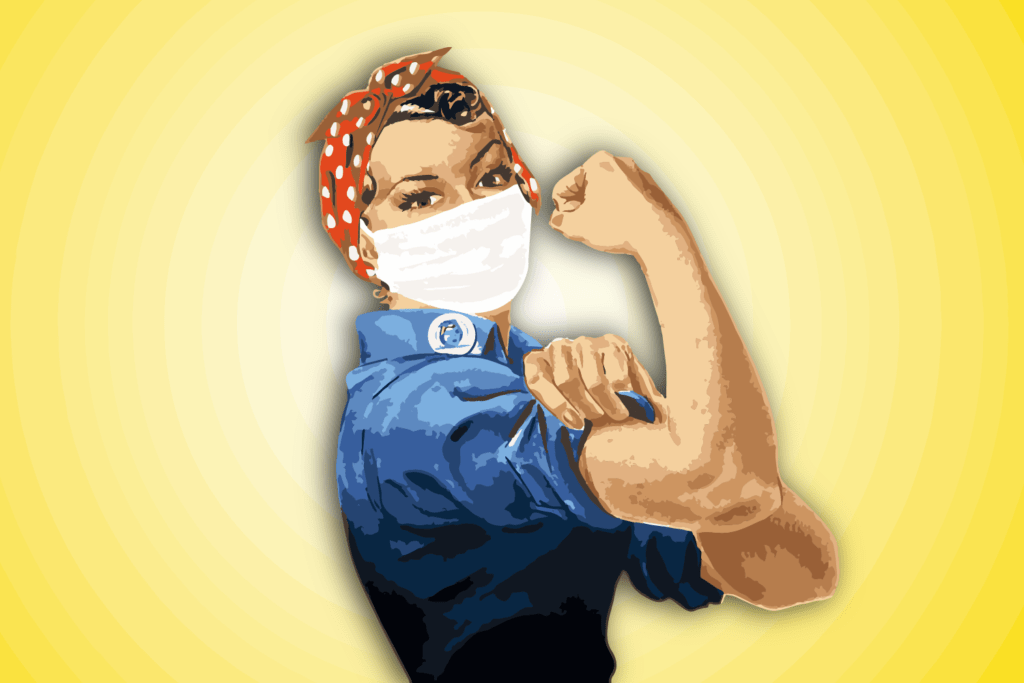We use cookies to improve your experience with Monash. For an optimal experience, we recommend you enable all cookies; alternatively, you can customise which cookies you’re happy for us to use. You may withdraw your consent at any time. To learn more, view our Website Terms and Conditions and Data Protection and Privacy Procedure.
Special Report: Women and COVID
Published on December 7, 2021 The story of women during the pandemic is not only about challenges at the frontline. : Michael Joiner, 360info
The story of women during the pandemic is not only about challenges at the frontline. : Michael Joiner, 360info
The pandemic has exacerbated the challenges that women across the world face. The disruptions to free movement, labour market and healthcare have disproportionately impacted women: they have lost their jobs at a higher rate, and those who remain in work are generally working in poorer conditions for less pay than their male counterparts.
The pandemic has also significantly impacted the home lives of many women. Despite fathers taking on more childcare duties, women continue to shoulder a vast proportion of caring duties — which has intensified with pandemic-related school shutdowns. With many countries implementing stay at home orders, this has limited access to support networks.
Domestic violence remains a global crisis: one in three women worldwide experience physical or sexual violence, mostly from an intimate partner. Since the start of the pandemic, calls to domestic violence helplines have increased in many countries. United Nations Secretary-General Antonio Guterres has declared the escalation in global domestic violence a “shadow pandemic”.
But the story of women during the pandemic is not only about challenges. Women on the frontline have been instrumental in fighting COVID-19, whilst nations led by women have generally performed best coming out of the pandemic. As the world rebuilds from two years ravaged by COVID-19, policymakers must consider the specific scale of disadvantages still faced by women across all facets of society.
REALITY CHECK
More than 64 million women lost their jobs in 2020 alone — equating to a five percent reduction of women in the workforce, compared to 3.9 percent for men.
Women comprise 70 percent of global healthcare workers, putting them on the frontlines in the pandemic.
45 percent of women surveyed by UN Women said they or a woman they know has experienced a form of violence since the start of the pandemic.
BIG IDEAS
Quote attributable to Andrea Hjálmsdóttir, assistant professor at the University of Akureyri:
“COVID has revealed even more than before that time and social roles are socially constructed. But now, we have the perfect opportunity to recreate that order.”
Quote attributable to Lindsey Leininger, public health scientist, Tuck School of Business:
“The key to crisis communication is saying what you know, saying what you don’t know, saying what you’re doing about it. And I think that helps people cope with the uncertainty, but it also, it’s a deep psychological need that needs to be attended to.”
PERSPECTIVES
Feature articles available for publishing under Creative Commons 4.0.
Women and men in charge differed in their pandemic message
By Supriya Garikipati (University of Liverpool), Uma Kambhampati (University of Reading), Abhilash Kondraganti (University of Liverpool)
When the COVID-19 pandemic took hold at the start of 2020, citizens the world over looked to their leaders. And depending if they were male or female, the message was different.
Science has a data problem and it continues to harm women
By Lavanya Vijayasingham, United Nations University International Institute for Global Health
From the recruitment phase, to measuring vaccine outcomes, sex and gender have not been priority issues, data on men and women clumped together, often impossible to untangle.
Icelandic equality went missing in pandemic
By Andrea Hjálmsdóttir, University of Akureyri, and Valgerður S. Bjarnadóttir, University of Iceland
Iceland has been described as a ‘paradise for women’, but even its women were unable to avoid the gendered division of labour brought on by COVID restrictions.
Dear Pandemic, these ‘nerdy girls’ are coming for you (Video)
By Lindsey Leininger, Tuck School of Business
Dear Pandemic is a science communications success story. Founder Lindsey Leininger explains why their platform works, and how to talk to the vaccine hesitant.
Battling menstrual taboos in a pandemic
By Heli Askola and Megan Adams, Monash University
Pandemic-related disruptions across Asia-Pacific had devastating consequences for people who menstruate, intensifying the long-standing issue of period poverty — the inability to access necessary sanitary products such as pads and tampons.
Editors Note: In the story “Woman and COVID” sent at: 29/11/2021 12:36.
This is a corrected repeat.






